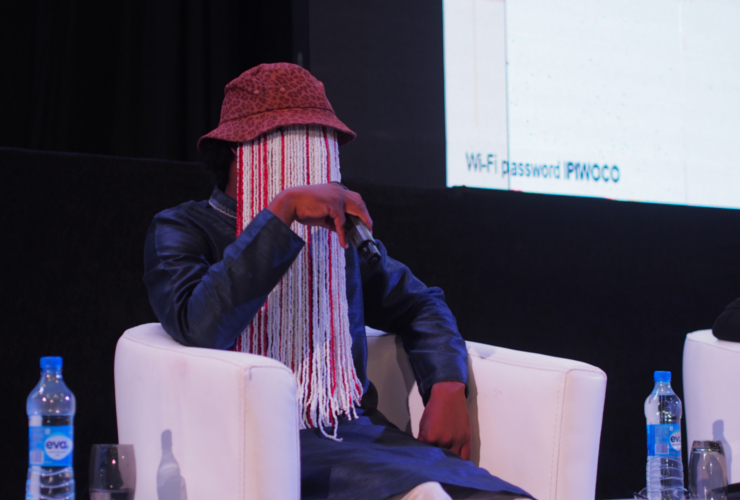Frequently named one of Africa’s most controversial journalists, undercover investigative reporter Anas Aremeyaw Anas has won fame across the continent for his self-described “name, shame and jail” style of journalism. Though his methods for exposing corruption and human-rights abuses, which frequently involve disguises and hidden cameras, have been both applauded and criticized, the results are clear: Criminals ranging from corrupt judges to human traffickers have been sent to jail because of Anas’s investigative stories. His work has been praised by influential figures from Barack Obama to Bill Gates.
Anas’s participation was one of the highlights of the International Press Institute (IPI)’s 2018 World Congress last month in Abuja, Nigeria, where the Ghana-born journalist joined a panel discussion on cross-border journalistic collaboration and professional ethics with the publisher of Nigeria’s Premium Times, Dapo Olorunyomi. IPI also sat down with Anas after the panel to discuss further his work as Africa’s most famous undercover journalist.
A Ghanaian superhero
Disguised in public with colourful beads and headcovers to protect his face from recognition, Anas is a mythical figure in the African media scene. In Ghana, he is a superhero, adored by the growing middle class, which Anas regards as the reference point of his work.
“My commitment is to the people of Ghana”, he said.
He also suggested that his no-holds-barred reporting was a product of the environment in which he operates, one plagued by systemic corruption.
“I am a product of my society”, he remarked. “I am doing journalism that affects my people. I don’t know if this kind of journalism would work in the U.S. or the UK.”
Anas works closely with law-enforcement authorities in following up on the criminal activity revealed in his reporting, providing police and prosecutors with detailed evidence and even testifying in court, if needed, to help send criminals to prison.
“Nothing is more frightening than getting a good story and waking up and realizing the bad guy of the story is walking on the same street”, he said during the panel discussion. “I don’t see anything wrong taking that one step further to assure the bad guy is put behind bars.”
Until this day, Anas has managed to protect his identity, and he noted that collaboration with the authorities has been fairly easy. As long as he has the support of the people, Anas said he was not too worried about the government’s turning against him.
“Nobody is a permanent friend in journalism – not the government, not even some of our colleagues”, Anas told IPI. “My greatest support base has been the people of Ghana. Do not trust anyone but your readers and listeners.”
To ensure his popular support, Anas said he makes sure his journalism can withstand critical scrutiny. Delivering airtight facts is an essential part of his work.
“I can tell you, the day you lose your mass support as a journalist, that’s your end”, Anas said during the panel.
A target of threats
Taking journalism one step further does not come without repercussions. Anas’s latest project, a documentary film called Number 12, which revealed massive corruption inside African football just ahead of the World Cup, has spurred serious threats against Anas, his team and his family.
In particular, one member of Ghana’s parliament, Kennedy Agyapong, has been persistent in threatening Anas on various channels. Agyapong has encouraged people to attack Anas on the streets and suggested he should be hanged. Agyapong has also claimed he has evidence of Anas accepting a bribe in exchange for not exposing a target.
Ghanaians have reacted to Agyapong’s accusations by defending Anas and posting with the hashtag #IamAnas. YouTube videos of Agyapong’s media appearances are accompanied by comments supporting the journalist.
The pattern of attacks is familiar to Anas, who has been a target of angry, powerful people before. The first aim of such people is to shut the story down, Anas said. But since he and his team ensure that the evidence is bulletproof, and the story cannot be killed, those powerful people then choose to come after the journalist.
Anas said his team followed strict security protocols to ensure everyone’s safety.
“The situation is pretty dangerous right now, but these days come and go”, Anas told IPI.
In a tight spot, support from the international community is of utmost importance to Anas.
“Nothing is as exciting and self-fulfilling as having friends in solidarity. You don’t know how much it helps us. Statements send a strong signal out there, that we are not alone.”
However, he said he does not underestimate the resources of the people who come after him.
“If I should die today, at least I would take solace in the fact that I’ve impacted positively in society”, he said.
Criticism of methods is welcome
One of the methods Anas uses is entrapment: He offers money to an allegedly corrupt person and films it on hidden camera. These sting operations are the main source of criticism against Anas. Even during the World Congress panel, some members of the audience questioned the ethics of Anas’s journalism.
“I don’t have a problem being called controversial; I think that is a fair description”, Anas replied. “But I believe in the controversy – it gives results.”
Anas said he did not expect his audience to swallow his stories “hook, line and sinker”. And he added that he welcomed the criticism and public scrutiny for helping his work stand the test of time.
However, Anas emphasized that he applies strict criteria before employing his undercover methods. Going undercover must be the last resort, there must be prima facie evidence of the wrongdoings, and the matter must be of public interest.
For Anas, his method is the only way to catch the “bad guys” red-handed.
“If you ask, ‘Mr. President, did you collect the money’, the answer will be ‘certainly not!’“ Anas remarked. “If anybody thinks there is a method better than undercover journalism to get these people, I want to hear it.”
